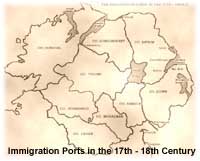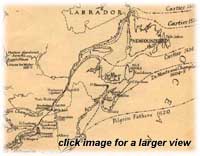
| Emigration - the Ulster-Scots (Scotch-Irish) What made them seek a better land? By Brian Orr Have a question? Click Here to go to Brian's own Discussion Board!
Yet they became increasingly unsettled with the growth of a strong evangelical movement in Scotland and they had seen the persecution of the Puritans and their emigration in 1620 . The death of King James I in 1625 saw the accession of his son, Charles I , who imposed new taxation, threatened to take back church lands and dealt severely with the Covenanters. Charles I was thus responsible for the ensuing Civil War and his own demise under the headsman's axe in 1649. This was followed by the rule of Cromwell and the Commonwealth and, in 1690, war with France.
In Ireland Thomas Wentworth , Earl of Strafford, became Lord Deputy and new Bishops were appointed which led to a severe anti-Presbyterian measures. In 1634 contact was made with the Massachusetts settlers and the subsequent response encouraged them to go to new lands and enjoy the religous freedom they craved.
There was almost constant turmoil in Ireland through the 17th and 18th centuries with assorted rebellions in 1640, 1650 (Cromwell) 1690 (Battle of the Boyne when William of Orange - Protestant, overcame James II - Catholic with French allies) and the 1798 and 1803 Rebellions. There was plenty to flee from, and of course, the ministers of the church went with or followed after their congregation when the latter emigrated. In the American colonies there was for a long time resentment against Catholics but the Presbyterians and other non-conformists enjoyed freedom of religion and thrived there.
This head start by the non-conformist churches was an important factor in later emigration because it set up the family connections to which the new emigrant naturally went. There was for a while in the early 18th century relative stability with some good harvests but even so there were still high rents, uncertainty about tenure of land, the bitter pill of having to pay tithes to support a church they did not attend, and the the encouragement of those who had already emigrated with success.
Another significant change was in the type of person emigrating; very broadly before about 1770 many emigrants were or became indentured servants and were employed as laborers as a means of doing the hard and dangerous jobs in the new frontier. There was also a period when the use of transportation was used to punish wrong-doers. Emigrants therefore tended to be younger people who went via England perhaps working there to get their passage money before emigrating, or signed up as "indentured servants". So there were regular and unrecorded movements from Ireland, through the ports of Londonderry, Portrush, Larne, Belfast, Portpatrick, Warrenpoint, Dundalk, and Drogheda to Glasgow, Liverpool, Fleetwood, Ardrossan, Greenock, London. From Dublin, Cork, Wexford, Waterford, the main ports were Bristol, Liverpool, Glasgow, Plymouth.
The US and Canada end of the journey is sometimes complicated because many immigrants initially went to stay in New York and in the vicinity of other East Coast ports. They stayed a while or took another ship to places like South Carolina because they had heard of the land that was available; or they went up the Ohio Valley and migrated West. Many went to Canada during and after the Revolutionary War because they were "Royalists" , some later returned to the US; or found life so hard and bleak in Prince Edward Island and Nova Scotia they moved on to places new.
It must be said that the Scotch-Irish also did sterling work in Canada but the pattern of emigration was influenced by the politics of the day and the "on-off" war with France. Canada was the new home for emigrants from Ulster in the mid- to late-18th century in response to land speculators. Arthur Dobbs was responsible for emigrations to both Canada and the Carolinas. Alexander McNutt obtained some 800,000 acres of land in Nova Scotia to be settled by emigrants but his plans were vetoed by the Privy Council who were afraid of the depopulation of Ulster and placed a ban on emigration to Nova Scotia for five years. Another was Thomas Desbrisay who made claims for lands that verged on the fraudulent. The point is that there was settlement long before the mass influx of the Famine emigrants (100,000 in 1847) that may be thought of as the beginning of the Scotch-Irish in Canada.
There were also considerable migration within and between the USA and Canada , as well as failures of enterprises such as their small farms in inhospitable places - that's why the land was free or at a nominal price. Many emigrants came from farming backgrounds and would have followed that tradition but Scots were involved in the tobacco, rum and sugar trades and could well have followed this with migration to Virginia , Georgia, and the Southern states. Undoubtedly they were in Alabama as there are many black American families with obvious Scottish names. The name has in some cases been that of the master adopted by slaves as well as mulatto descendants from mixed marriages and extra marital relations.
Perhaps the thing to remember is that these immigrants had known the most difficult times and had nothing to lose but their lives. They were prepared to go anywhere that offered even half a chance of a living and prosperity, so to find them in the Gold Rushes to Alaska or Ballarat in Australia, on the frontiers fighting Indians, in the mines digging coal, or building the subways of New York is not surprising. Moreover, they had a tenacity of purpose and they came from a culture that encouraged learning as part of their faith. A good education was seen as an asset and this they used to be the entrepreneurs of their day to join the ranks of doctors, vetinarians, lawyers, land surveyors, engineers, bankers, judges, politicians - all the essential occupations that a new country and new society needed - and along the way, several became President of the USA .
Part One:
The Beginning of the Scotch-Irish |
Thursday, December 26th, 2019
Attention visitors: Tartans.com is back. Please note that this is a snapshot of the site as it existed nearly 20 years ago and you may encounter broken links; we are still combing through the site and correcting those as we find them. Please also note that some sections are currently not functional, primarily the discussion forums/clan chat boards.
|
** HOME - First Time Visitors - Glossary - - Contact Us ** Awards | Bibliography | Clan Calendar | Clan Chat | Clan Finder | History | Famous Scots | Genealogy | Great Hall of the Clans | Links | News and Features | Scots on the Net | Search | Site Map The Gathering of the Clans
Copyright 1995- Tartans.com - All Rights Reserved. |
 Hollywood would have us believe that emigration from Ireland was a result of the Great Famine in 1849-50, and consisted solely of native Irish persons with lilting brogue and sultry looks. But emigration in numbers from Ireland began much earlier and was largely of people of Scottish origin. For the Scottish Planter families in the 1630s, the turning point for some came with an increase in the opposition to Stuart religious policies. They had tried hard to fit their Scottish ecclesiastical system into the Irish system which held the Church of Ireland as the lawful church, and had some success.
Hollywood would have us believe that emigration from Ireland was a result of the Great Famine in 1849-50, and consisted solely of native Irish persons with lilting brogue and sultry looks. But emigration in numbers from Ireland began much earlier and was largely of people of Scottish origin. For the Scottish Planter families in the 1630s, the turning point for some came with an increase in the opposition to Stuart religious policies. They had tried hard to fit their Scottish ecclesiastical system into the Irish system which held the Church of Ireland as the lawful church, and had some success.



